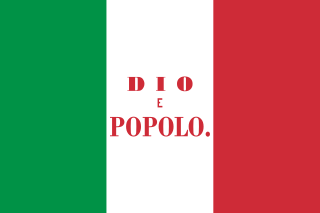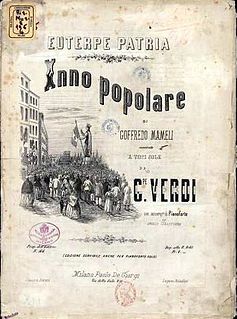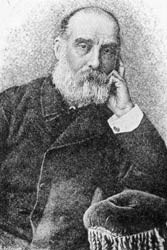This page is based on this
Wikipedia article Text is available under the
CC BY-SA 4.0 license; additional terms may apply.
Images, videos and audio are available under their respective licenses.

The Roman Republic was a short-lived state declared on 9 February 1849, when the government of the Papal States was temporarily replaced by a republican government due to Pope Pius IX's flight to Gaeta. The republic was led by Carlo Armellini, Giuseppe Mazzini, and Aurelio Saffi. Together they formed a triumvirate, a reflection of a form of government seen in the ancient Roman Republic.

Young Italy was a political movement for Italian youth founded in 1831 by Giuseppe Mazzini. After a few months of leaving Italy, in June 1831, Mazzini wrote a letter to King Charles Albert of Sardinia, in which he asked him to unite Italy and lead the nation. A month later, convinced that his demands did not reach the king, he founded the movement in Marseille. It would then spread out to other nations across Europe. The movement's goal was to create a united Italian republic through promoting a general insurrection in the Italian reactionary states and in the lands occupied by the Austrian Empire. Mazzini's belief was that a popular uprising would create a unified Italy. The slogan that defined the movement's aim was: ''Union, Strength, and Liberty''. The phrase could be found in the tricolor Italian flag, which represented the country's unity.

Bettino Ricasoli, 1st Count of Brolio, 2nd Baron Ricasoli was an Italian statesman.

"Suona la tromba" or "Inno popolare" was a secular hymn composed by Giuseppe Verdi in 1848 to a text by the Italian poet and patriot Goffredo Mameli. The work's title comes from the opening line of Mameli's poem. It has sometimes been referred to as "Grido di guerra" and "Euterpe Patria".

Aurelio Saffi was an Italian politician, active during the period of Italian unification. He was an important figure in the radical republican current within the Risorgimento movement and close to its leader and chief inspiration, Giuseppe Mazzini.

The Italian Fasci of Combat, until 1919 called Fasci of Revolutionary Action, was an Italian fascio organization, created by Benito Mussolini in 1914.

Giuditta Bellerio Sidoli was an Italian patriot and revolutionary protagonist in multiple efforts for Italian unification. She was also the lover of Giuseppe Mazzini for a period and operated a salon in Turin for Italian expatriates.
Abhinav Bharat Society was a secret society founded by Vinayak Damodar Savarkar and his brother Ganesh Damodar Savarkar
in 1903. Initially founded at Nasik as Mitra Mela when Vinayak Savarkar was still a student Fergusson College at Pune, the society grew to include several hundred revolutionaries and political activists with branches in various parts of India, extending to London after Savarkar went to study law. It carried out a few assassinations of British officials, after which the Savarkar brothers were convicted and imprisoned. The society was formally disbanded in 1952.

Italian nationalism asserts that the Italians are a nation with a single identity and seeks to promote the cultural unity of Italy as a country, in a definition of Italianness claiming descent from the Latins who originally dwelt in Latium and came to dominate the Italian peninsula and much of Europe. Italian nationalism has also historically adhered to imperialist theories. The romantic version of such views is known as Italian patriotism, while their integral version is known as Italian fascism.
Young Europe was an international association formed in 1834 by Giuseppe Mazzini on the model of Young Italy. It was composed of the national societies of Young Italy, Young Poland, and Young Germany, which, independent in their own sphere, acted in common, through a central committee, for the furthering of the principles of liberty, equality, and humanity in Europe. The headquarters of the society were in Switzerland, where, in 1835-36, was brought about the organization of a French society, Young France. The activity of the society speedily aroused the opposition of the Swiss authorities, who expelled many of its members from the country.

Elizabeth "Eliza" Ann Ashurst Bardonneau was a member of an important family of radical activists in mid-nineteenth-century England and the first translator of George Sand's work into English. The family supported causes ranging from women's suffrage to Italian unification.

Giuseppe Mazzini is an outdoor bronze bust of Giuseppe Mazzini by Giovanni Turini, overlooking Sheep Meadow in Central Park in Manhattan, New York. The sculpture was commissioned by a group of Italian-Americans and was dedicated in 1878 with a speech by American Poet William Cullen Bryant. It sits on a granite pedestal, which includes two inscriptions that translate to "thought and action" and "God and the people". In 1994, the bust was restored by the Central Park Conservancy.
The Moderate Party, collectively called Moderates, was an Italian pre-Unification political rally, active during the Risorgimento (1815–1861). The Moderates were never a formal party, but only a movement of liberal-minded reformist patriots, usually secular, from politics, military, literature and philosophy.
The Action Party was an Italian pre-unitary political party active during the Risorgimento. It was the first organized party in the history of Italy.

Mazzini canta Battisti is an album by Mina released in 1994.
The Mazzini Society was an antifascist political association, formed on a democratic and republican basis, situating itself within the tradition of the Risorgimento, and created in the United States by Italian-American immigrants in the late 1930s. It was named after Giuseppe Mazzini, a leading figure of Italian reunification in the mid-19th century, who had worked from exile.

Giulietta Pezzi was an Italian writer and journalist whose work included poetry, four novels, and a five-act play. Born and educated in Milan, she was a devoted follower of Mazzini and active in the Italian republican and unification movements. In her later years she wrote for several newspapers and dedicated herself to the establishment of free public schools in Italy based on Mazzini's educational philosophy. She died in the city of her birth at the age of 71. During her lifetime several art songs were dedicated to her, including Bellini's "Vaga luna, che inargenti".
Stefano Mazzini is an Italian football player. He plays for Carrarese on loan from Atalanta.












